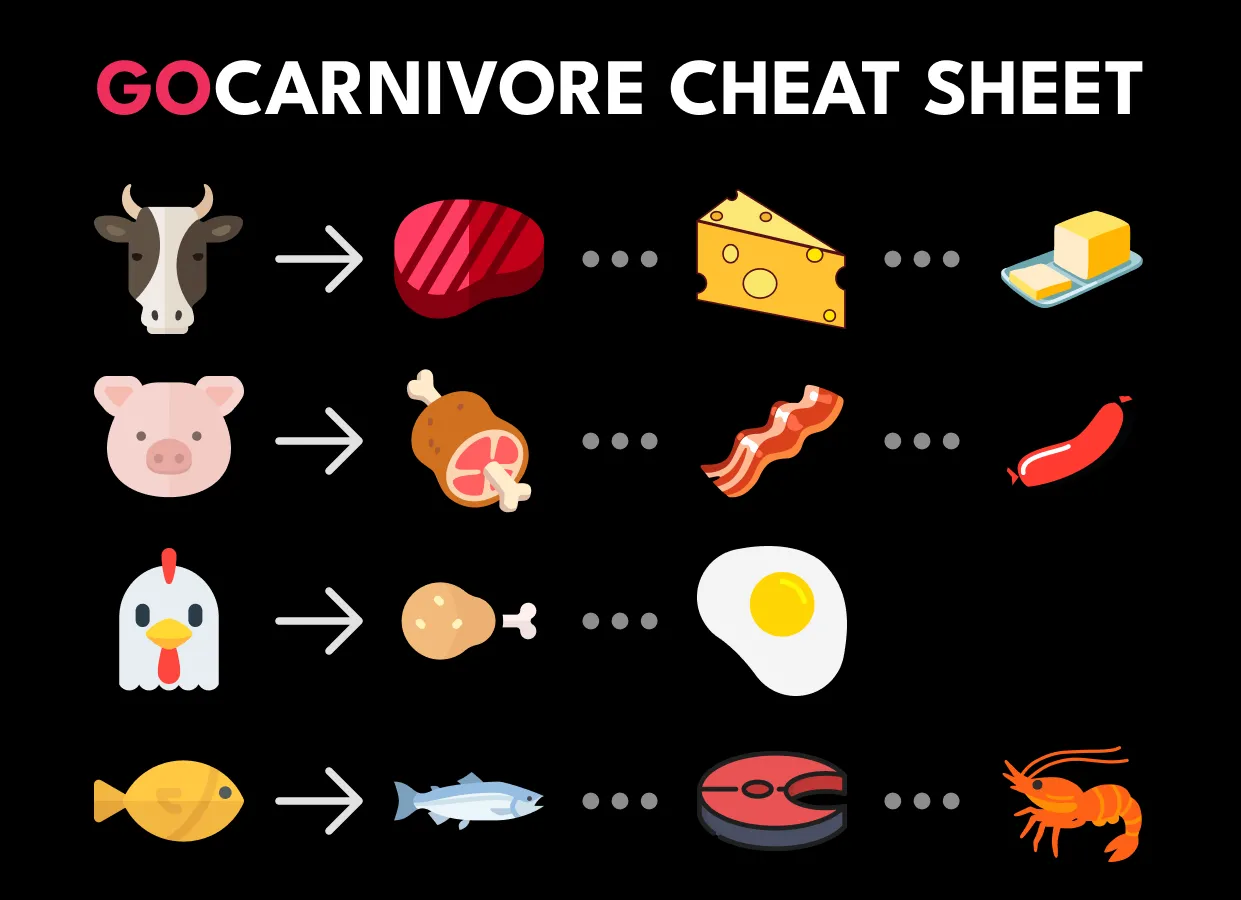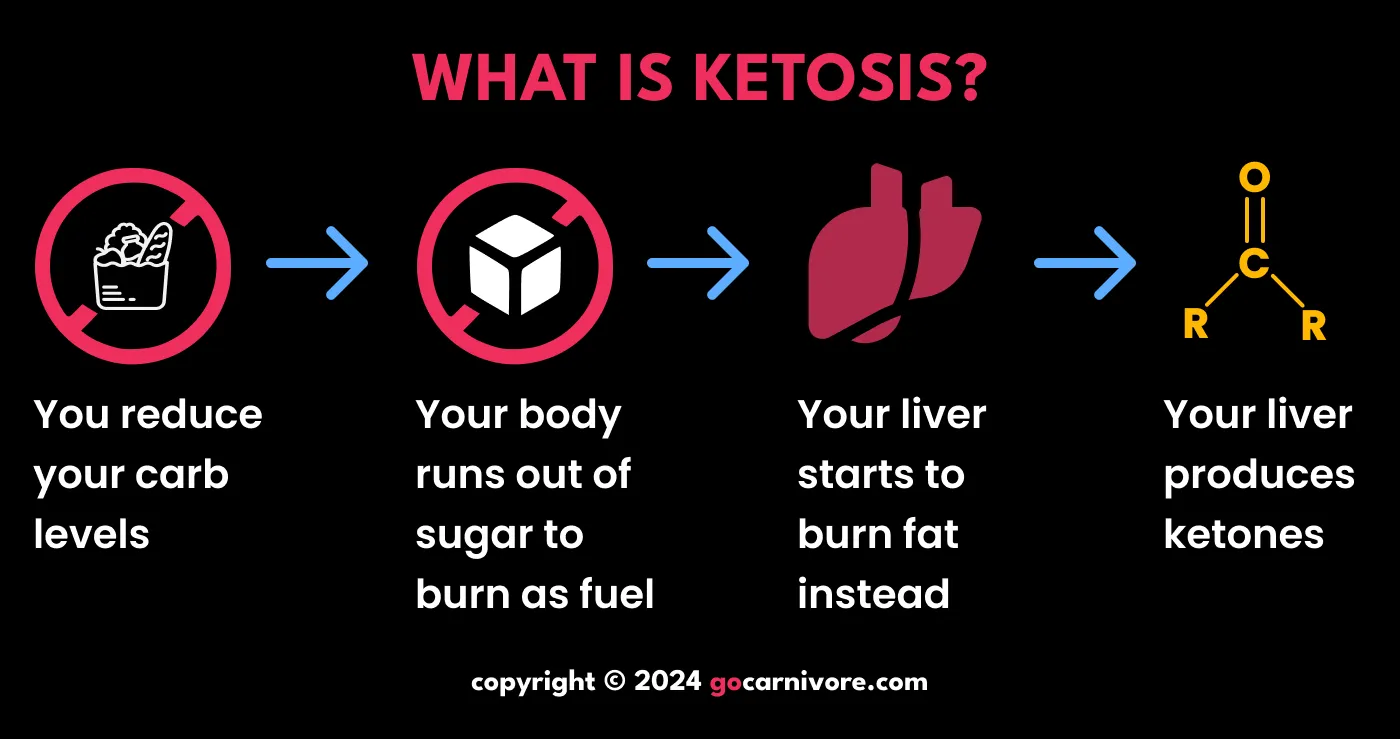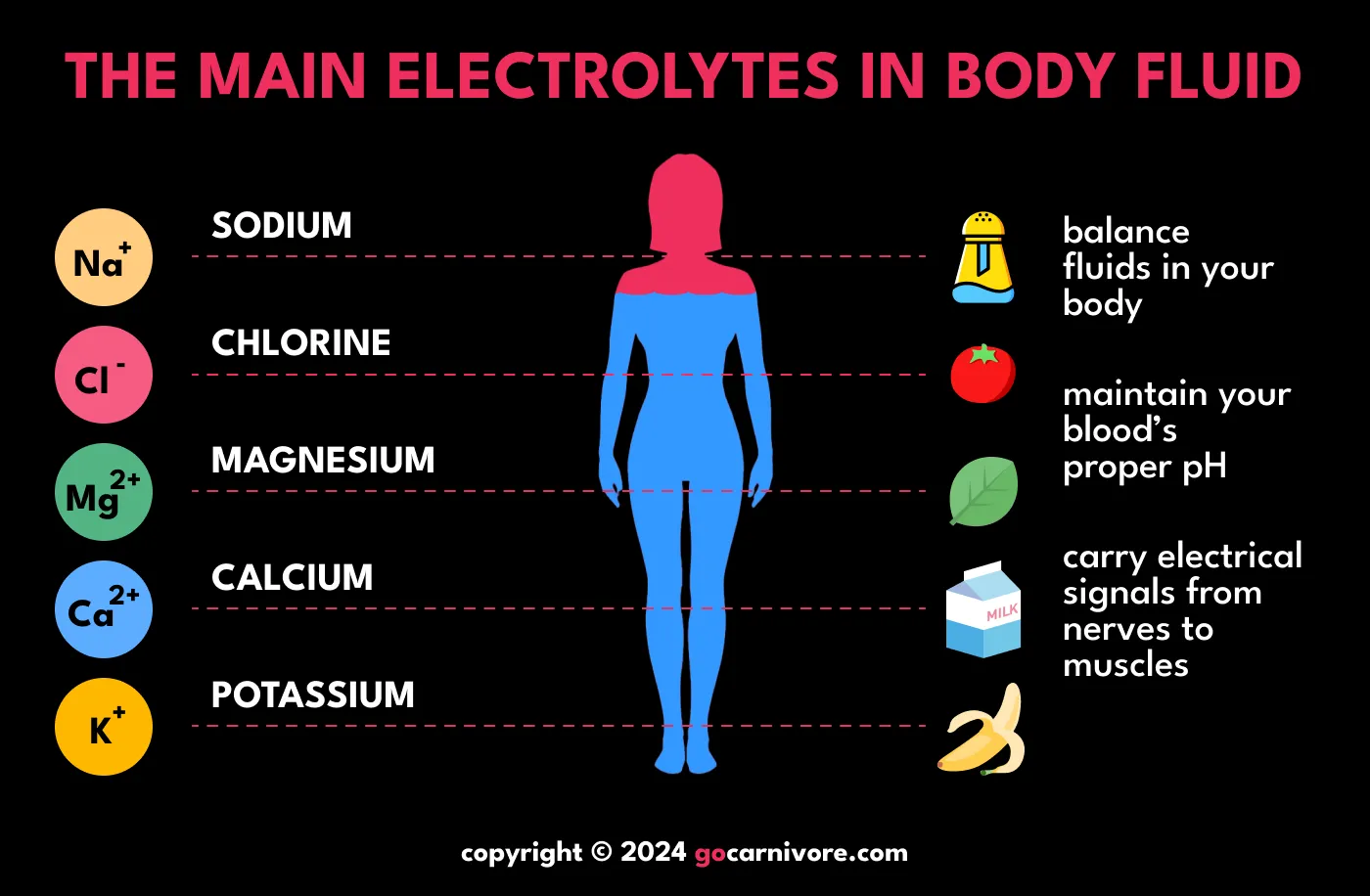
To get the best Carnivore Diet results, you need to learn about the factors affecting your success, including daily macronutrients and where you source them from. While you should minimize carbohydrates to induce and maintain ketosis, you should keep a proper fat-to-protein ratio and stay hydrated to achieve various positive Carnivore Diet results. Let’s learn about these results and tips to get faster results.
The Carnivore Diet is an elimination, low-carb, animal-based eating plan, which can help you reduce inflammation, regulate hormones and blood sugar levels, and fight autoimmune conditions and even cancer by balancing macronutrients, minimizing carbohydrates, and increasing fat and protein intake.
Balancing macronutrients means finding the proper ratio of carbohydrates, fat, and protein. Use this free Carnivore Diet Macro Calculator to find the right balance of macros based on your age, gender, and activity level.
To reach a proper macronutrient balance, you need to provide daily calories from high-quality animal-based sources.
So, you should consume only animal-based products like ruminant meat, organ meats, poultry, fish and seafood, and eggs, and avoid plant-based foods, such as vegetables, legumes, nuts, and seeds.
Eliminating plant foods to minimize carbohydrates, which induces and maintains ketosis, reduces inflammation, and regulates hormones, helps you get the best Carnivore Diet results. But how does this happen?
Learn More: Carnivore Diet vs. Keto Diet: Results, Meals and Food List
The Carnivore Diet results mainly stem from ketosis that creates a metabolic shift and regulates different functions of the body.
Ketosis is a metabolic state in which the body uses fat sources instead of carbohydrates (sugar) to produce energy. When you consume fewer carbohydrates, the liver can turn fat into ketones to produce energy.
Burning fat instead of carbohydrates means melting fat and weight loss. However, this is not the only advantage of ketosis, and it can lead to various health benefits.


Ketosis is important because it can lead to various essential health benefits, including balancing hormones, reducing chronic diseases, and boosting weight loss:
So, to experience these Carnivore Diet results, you should focus on certain strategies, like minimizing carbohydrates and consuming high-quality, zero-carb satiating foods.
Learn More: Top 10 Best Low-Carb Protein Powders for Weight Loss
Meats, eggs, organ meats, and animal fats are satiating foods, meaning that they keep you full for a long time. This is because they contain high levels of fat and protein.
Protein is the most satiating macronutrient and burns more calories during digestion. Protein is necessary for preserving muscle mass and proper metabolic function.
Animal fats reduce the speed of digestion and balance hunger hormones. Also, nutrients found in organ meats help us feel full for a longer time, which means we need to consume fewer calories and melt fat more efficiently.
Learn More: Long-Term and Short-Term Side Effects of The Carnivore Diet

On the Carnivore Diet, you need to avoid all processed foods. This is because these foods contain high levels of sugars, unhealthy fats, and additives, which can cause inflammation and weight gain.
Avoiding these foods can improve gut health and reduce inflammation through different processes in the body.
These changes can improve health markers such as blood sugar levels, hormonal function, and blood pressure, which significantly impact metabolism and weight management and are among the main Carnivore Diet results.
Learn More: Ray Peat Diet: Everything You Should Know
Different individuals get different Carnivore Diet results because of their eating habits, current health status, inflammation levels, and underlying chronic illnesses.
Some individuals experience quick improvements in metabolic markers like blood sugar levels, blood pressure, and waist circumference, while others may take months to see changes.
But generally, to get the best Carnivore Diet results, you need to focus on healing and balancing hormones, not just weight loss.
The reason is that many health issues, including stubborn belly fat, are caused by hormonal imbalances or chronic inflammation. Addressing these root causes allows your body to naturally move towards a healthier state.
By addressing these causes, you can experience positive Carnivore Diet results. However, remember that some people see results faster than others.
Learn More: The Best Meat to Smoke: 15 Best Cuts to Throw into a Smoker
Your metabolic flexibility, meaning your body’s performance in metabolic markers like blood sugar levels, blood pressure, HDL cholesterol levels, waist circumference, and triglycerides, determines how fast you can see Carnivore Diet results.
Here are the results individuals can generally experience from the first week on the Carnivore Diet until 3 months.
Learn More: Can I Lose Weight on a Carnivore Diet? How Much? How Fast?
During the first 7 days on the Carnivore Diet, many individuals lose 5-15 pounds due to water weight loss and reduced inflammation.
Eliminating carbohydrates empties glycogen stores, which are bound to water. Each gram of carbohydrates includes 3 grams of water, so avoiding carbohydrates means losing water.
This initial water weight loss can cause keto flu symptoms, including headache, nausea, diarrhea, and constipation, which usually fade away as the body adjusts to the new fat-burning state.
Solution: To avoid the keto flu symptoms more quickly, drink plenty of water, use electrolytes, or add salt to your foods. Salt contains sodium, potassium, and magnesium, which help refill the electrolytes lost.

Two weeks into the Carnivore Diet, some people hit a weight loss plateau, which is normal because their bodies are adjusting to shifting to fat-burning and hormone-balancing without carbohydrates.
Depending on individual factors, this adjustment process can take a few days to some months. However, you can experience more energy, better sleep, and reduced cravings in the meantime, even if weight loss slows.
Hunger hormones are also affected by this low-carbohydrate lifestyle, and you will feel less hungry and consume fewer calories.
Solution: To successfully go through this phase, balance your fat and protein intake using apps like GoCarnivore. Also, monitor your body’s reactions to different foods and modify your approach based on your body’s responses to optimize the results.
Learn More: The 60-Hour Fast Benefits and Results: Is It Safe?
One month into the Carnivore Diet, many people report improvements, including better mental clarity and mood and reduced symptoms of depression and anxiety.
Many also experience more energy, better sleep, and resumed weight loss as hormones balance and stabilize.
If your body hasn’t improved according to this timeline, don’t be discouraged, and don’t compare yourself to others, as healing depends heavily on individual factors.
Instead, connect with the Carnivore community for support and guidance. You can also consult with experienced dieters or healthcare professionals.
Solution: To get the best Carnivore Diet results, follow the diet correctly by eliminating carbohydrates, consuming enough fat and protein, and staying hydrated. If improvements are slow, communicate with the GoCarnivore Community, contact Carnivore Doctors, or watch these Carnivore Courses to find the problems, solve them, and optimize your approach.
Within 60 days, many individuals experience less joint pain, better skin, and improved digestion due to reduced inflammation. But remember that results depend on how well you follow the diet. Inconsistency in your approach can lead to later results.
At this point, you have a better grasp of the impact of different foods on your body. If you are in the transition phase or are not getting the desired results, join our Carnivore coaching sessions to get personalized guidance.
After three months, many people see significant Carnivore Diet results, including better metabolism and hormonal balance, which boost weight loss. Some also report losing up to 60 pounds.
If your progress is slow, consider these factors:
Solution: To address these issues, join Carnivore Coaching Sessions with Carnivore doctors and coaches for personalized advice, strategies to promote weight loss, and answers to your Carnivore Diet questions.
As you continue your Carnivore journey, significant changes can occur in your body, and you will experience optimal results and health improvements.
There are various success stories from individuals who continued following the Carnivore Diet; many who stick with it long-term report significant improvements in physical and mental health.
For example, Lori, a cancer survivor, found the diet supportive of her health and recovery, while Judy, at 64, managed her lupus symptoms and lost weight. Also, Richard, a heart patient, could get rid of his lifetime medications at 66 years of age.
You can also check these videos from individuals reporting real Carnivore Diet results. Also, various Carnivore Diet Before and After Photos show you how Carnivore can affect you.
Although seeing Carnivore Diet results takes time, there are some hacks to get faster results.
The following points can help you speed up your Carnivore Diet results:
Even if you are following a zero-carb Carnivore Diet, you may neglect hidden carbohydrates in some foods, which can hinder your progress. Here are the most common sources of hidden carbs:
These hidden carbohydrates can prevent your body from entering or maintaining ketosis. To avoid this, always check labels and choose whole, unprocessed animal foods.
If you are not seeing the expected results, track your food intake carefully for a few days to identify any sources of hidden carbohydrates.
Learn More: The Gary Brecka Diet: How to Follow The 30/30/30 Method?
Hormonal imbalances and chronic stress can negatively impact your Carnivore Diet results, especially weight loss. Hormones regulate metabolism, fat storage, and appetite, while stress can disrupt hormonal balance.
Women’s menstrual cycle leads to hormonal changes that can affect weight and water retention. Also, polycystic ovary syndrome (PCOS) or thyroid disorders can hinder weight loss.
Physical or emotional stress can increase the level of cortisol (the stress hormone). Chronically high cortisol can increase fat storage, especially around the belly, disrupt sleep quality, and negatively affect hunger and metabolism hormones.
To avoid these problems:
Learn More: Can I Eat Cheese on Carnivore Diet? The Best & Worst Cheese

A proper fat-to-protein ratio is essential in inducing ketosis, regulating hormones, and maintaining muscle mass.
To induce ketosis, consume enough fat, but you also need adequate protein to build and maintain muscle mass, which is essential for proper metabolic function, especially after 40 years of age.
Generally, some people need a higher fat intake, while others do better with more protein. Activity level, age, gender, and health status affect your optimal ratio. However, you can consider the following points to find the proper ratio:
Learn More: The BBBE Diet Benefits, Side Effects, Meal Plan, and Foods

Drinking enough water is essential for various reasons. One of the leading causes of problems in losing weight is consuming insufficient water, not food intake.
Water participates in different body processes, including metabolism and fat breakdown. Without enough water, the body cannot burn fat effectively.
Also, we may confuse thirst signals with hunger, leading to unnecessary eating when we actually need water.
Also, on the Carnivore Diet, you must stay hydrated, especially during the initial adaptation phase, because reducing carbohydrates results in losing water (each gram of carbohydrates contains 3 grams of water).
Additionally, as you reduce carbohydrate intake, your body excretes more sodium, potassium, and magnesium, which can cause fatigue, headaches, and muscle cramps.
So, to ensure proper hydration:
Learn More: The 60-Hour Fast Benefits and Results: Is It Safe?

Although the Carnivore Diet generally reduces calories by focusing on satiating foods, individuals may still consume too many calories.
The human body processes different types of fats in various ways. For example, the body easily processes the natural fat in meat. However, overconsumption of added fats, especially processed oils or too much rendered fat, can cause weight gain.
So, while your body can regulate whole foods, it cannot easily process isolated fats. This is why some people gain weight when consuming large quantities of butter or tallow, even though they still eat only animal products.
If this is your case, consider these points:
Learn More: Female Carnivore Diet: 30-Day Meal Plan, Results, & Recipes
To achieve long-term, sustainable Carnivore Diet results, you need to be patient. It's easy to get discouraged if you suddenly stop losing weight or aren't seeing the improvements you expected. However, remember that enduring change takes time.
Hitting plateaus is normal and shows that your body is experiencing internal changes. During these times, it's good to:
Avoid frequent changes to your approach and give your body time to adapt.

If you are consistently following the Carnivore Diet and not seeing results, it may be worth revisiting the previous points about hidden carbs, stress management, hydration, and fat-to-protein ratios. Sometimes, small adjustments can lead to significant breakthroughs.
You can see the Carnivore Diet results after the initial adaptation phase. But please remember that it takes some time for your body to adapt to the new eating style and fat processing.
Don’t compare your results with others, as your health status, activity level, and metabolic factors differ. It’s wise to just stick to the diet, consult a healthcare professional if needed, and be patient to get the best results.
Here are answers to the most frequently asked questions about Carnivore Diet results.
Although research on the long-term effects of the Carnivore Diet is still limited, short-term results are generally safe for most healthy adults. Check the long-term and short-term side effects of the Carnivore Diet.
Some people add electrolytes or magnesium. Check the 10 most important Carnivore Diet supplements.
Learn More: Do I Need Carnivore Diet Supplements to Boost the Results?
Weight loss depends on various individual factors, but it is often rapid in the first 30 days.
Yes, consuming high protein and lifting supports muscle growth.